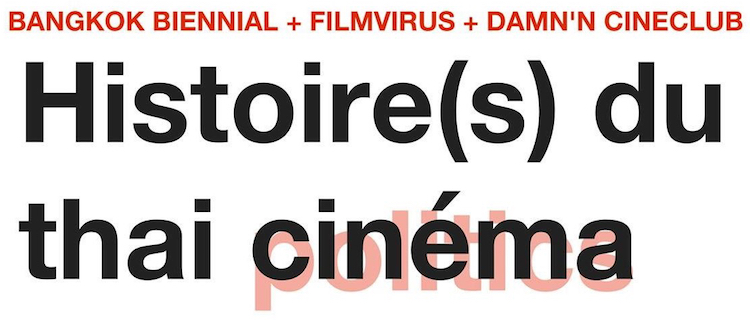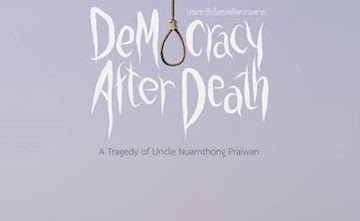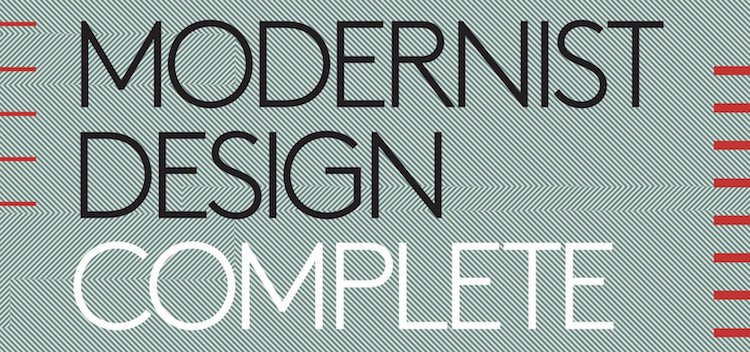
Histoire(s) du thai cinéma (‘histories of Thai cinema’), a marathon programme of Thai short films with political themes, took place over a weekend at Bangkok’s Dam’n Cineclub earlier this year. The event, split into two twelve-hour sessions (18th and 19th August), was curated by Wiwat Lertwiwatwongsa.
The selected films covered Thai politics since the democratic revolution eighty years ago. The Six Principles (สัญญาของผู้มาก่อนกาล), directed by Abhichon Rattanabhayon, examines contemporary public perceptions of the 1932 revolution. Octoblur (ลมตุลาคม), directed by Patana Chirawong, intercuts footage of the 14th October 1973 massacre with the funeral of Thanom Kittikachorn, the military dictator who ordered the attack. Suchart Sawasdsri’s “Red” at Last (มนัส เศียรสิงห์) and Manussak Dokmai’s Don’t Forget Me (อย่าลืมฉัน) both include footage of the 6th October 1976 massacre: “Red” at Last is narrated by a survivor of the tragedy, while Don’t Forget Me features incongruous narration taken from a vintage documentary on the Mlabri tribe.
Thailand’s recent political polarisation was represented by films examining the People’s Alliance for Democracy, United Front for Democracy Against Dictatorship, and People’s Democratic Reform Council protests. In Prap Boonpan’s The Bangkok Bourgeois Party (ความลักลั่นของงานรื่นเริง), a group of yellow-shirted Bangkokians murder a man merely because he disagrees with their ideology. (This dystopian satire later became a reality, when PAD guards killed Narongsak Krobtaisong.) The UDD movement is featured in Red Movie (แกะแดง), directed by the Underground Office collective, which ends somewhat idealistically with John Lennon’s utopian song Imagine. PDRC demonstrations appear in Boonyarit Wiangnon’s Lice in the Wonderland (เพลี้ย) and two films by Chulayarnnon Siriphol: Here Comes the Democrat Party (ประชาธิปัตย์มาแล้ว) and Myth of Modernity.
The films with the most powerful impact were Nil Paksnavin’s Rajprasong (ราชประสงค์), Nontawat Numbenchapol’s Gaze and Hear (สายตา รับฟัง), and Re-presentation (ผีมะขาม ไพร่ฟ้า ประชาธิปไตย ในคืนที่ลมพัดหวน) by Chai Chaiyachit and Chisanucha Kongwailap. Rajprasong ends with a black screen and the jolting sound of eighty-seven gunshots, representing the victims of the 2010 massacre in downtown Bangkok. Gaze and Hear is a parody of royalist propaganda, with a hypnotic voiceover and flashing lights inducing a trance-like state of obedience. Re-presentation ends with an artist unsuccessfully attempting to draw Democracy Monument, and tearing up his sketch to reveal a drawing of a Rama V statue on the page beneath, a reference to the established hierarchies underlying Thailand’s elusive democracy.
The selected films covered Thai politics since the democratic revolution eighty years ago. The Six Principles (สัญญาของผู้มาก่อนกาล), directed by Abhichon Rattanabhayon, examines contemporary public perceptions of the 1932 revolution. Octoblur (ลมตุลาคม), directed by Patana Chirawong, intercuts footage of the 14th October 1973 massacre with the funeral of Thanom Kittikachorn, the military dictator who ordered the attack. Suchart Sawasdsri’s “Red” at Last (มนัส เศียรสิงห์) and Manussak Dokmai’s Don’t Forget Me (อย่าลืมฉัน) both include footage of the 6th October 1976 massacre: “Red” at Last is narrated by a survivor of the tragedy, while Don’t Forget Me features incongruous narration taken from a vintage documentary on the Mlabri tribe.
Thailand’s recent political polarisation was represented by films examining the People’s Alliance for Democracy, United Front for Democracy Against Dictatorship, and People’s Democratic Reform Council protests. In Prap Boonpan’s The Bangkok Bourgeois Party (ความลักลั่นของงานรื่นเริง), a group of yellow-shirted Bangkokians murder a man merely because he disagrees with their ideology. (This dystopian satire later became a reality, when PAD guards killed Narongsak Krobtaisong.) The UDD movement is featured in Red Movie (แกะแดง), directed by the Underground Office collective, which ends somewhat idealistically with John Lennon’s utopian song Imagine. PDRC demonstrations appear in Boonyarit Wiangnon’s Lice in the Wonderland (เพลี้ย) and two films by Chulayarnnon Siriphol: Here Comes the Democrat Party (ประชาธิปัตย์มาแล้ว) and Myth of Modernity.
The films with the most powerful impact were Nil Paksnavin’s Rajprasong (ราชประสงค์), Nontawat Numbenchapol’s Gaze and Hear (สายตา รับฟัง), and Re-presentation (ผีมะขาม ไพร่ฟ้า ประชาธิปไตย ในคืนที่ลมพัดหวน) by Chai Chaiyachit and Chisanucha Kongwailap. Rajprasong ends with a black screen and the jolting sound of eighty-seven gunshots, representing the victims of the 2010 massacre in downtown Bangkok. Gaze and Hear is a parody of royalist propaganda, with a hypnotic voiceover and flashing lights inducing a trance-like state of obedience. Re-presentation ends with an artist unsuccessfully attempting to draw Democracy Monument, and tearing up his sketch to reveal a drawing of a Rama V statue on the page beneath, a reference to the established hierarchies underlying Thailand’s elusive democracy.




